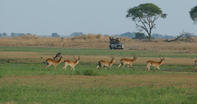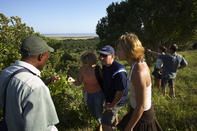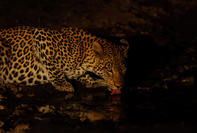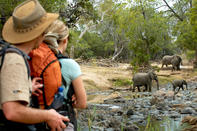
The best way to see South African wildlife is on a safari. Tourists will be able to see the country’s most unique and beautiful animals while traversing through the gorgeous African bushveld. A safari experience is usually synonymous with luxury, elegance and lots of gin & tonics - it represents a romanticised idea of exploring the wild animal kingdom of South Africa.
Before you grab your camera and head out on a safari, there are a few important things to keep in mind so that you’ll have the safest, best experience you can.
Safety Briefings

On an organized safari where you are in the care of a professional guide or ranger, you're unlikely to be placed in a dangerous situation. If you're going for a walk, ride, or paddle in dangerous territory, your guide will brief you about all the possible dangers and tell you how to behave in the unlikely event of an emergency. Listen to all the safety briefings and adhere to them strictly.
Never try to get an animal to pose with you. This is probably the biggest cause of death and injury on safaris, when visitors don't listen to or believe the warnings from their rangers or posted notices in the public parks. The animals are not cute and they are not tame. An herbivore impala, giraffe, or ostrich can kill you just as easily as a lion, elephant, or buffalo can. Smaller animals such as mongooses and otters are also predators that can kill or injure something much bigger than themselves, so stay clear of them as well.
Night Routine

At night, never sleep out in the open in any area with wildlife. If you're sleeping in a tent, make sure it's fully closed; if it's a small tent place something between you and the side of the wall to prevent an opportunistic bite from the outside. If you're in your tent and not exposed, you should be quite safe. Few people lose their lives to lions or hyenas. Malaria is a much more real danger, so keep your tent zipped up tight at night to keep out mosquitoes.
Nearly all camps and lodges insist that an armed ranger accompany you at night; no one should ever walk without an armed chaperone at night. If, for some inexplicable reason; you are walking alone, you should carry and use a flashlight - known locally as a torch - which all lodges and tented camps supply. Shine your torch in a wide arc all around you; if there's anything lurking up ahead you'll see its eyes shining. If you do pick up any night eyes, back off slowly in the direction you came from and call a ranger to accompany you.
Keep Calm

If you find yourself isolated and feel threatened, make a noise. But don't turn around and run; if it's a predator, it will pounce on you.
If you hear the thumping footfalls of a large beast - hippopotamus, elephant, buffalo, or rhinoceros - jump off the path and out of its way. Small nocturnal creatures such as owls and bush babies have large eyes that, when caught in the light, may make you think they belong to a huge monster. Go call a ranger or member of the camp staff; it's always better to err on the side of safety.
If you're walking in the bush at night, whistle or sing to alert anything or anyone in your path. The biggest danger is that you will startle an animal by suddenly bearing down on it; it will attack as its first means of defense.
 We’ve used our extensive knowledge to give you tips and answer the most frequently asked questions about African safari holidays....
We’ve used our extensive knowledge to give you tips and answer the most frequently asked questions about African safari holidays.... The Kruger National Park (KNP, or simply ‘Kruger’, for short) is the premier game reserve in South Africa. Offering excellent Big Five g...
The Kruger National Park (KNP, or simply ‘Kruger’, for short) is the premier game reserve in South Africa. Offering excellent Big Five g...